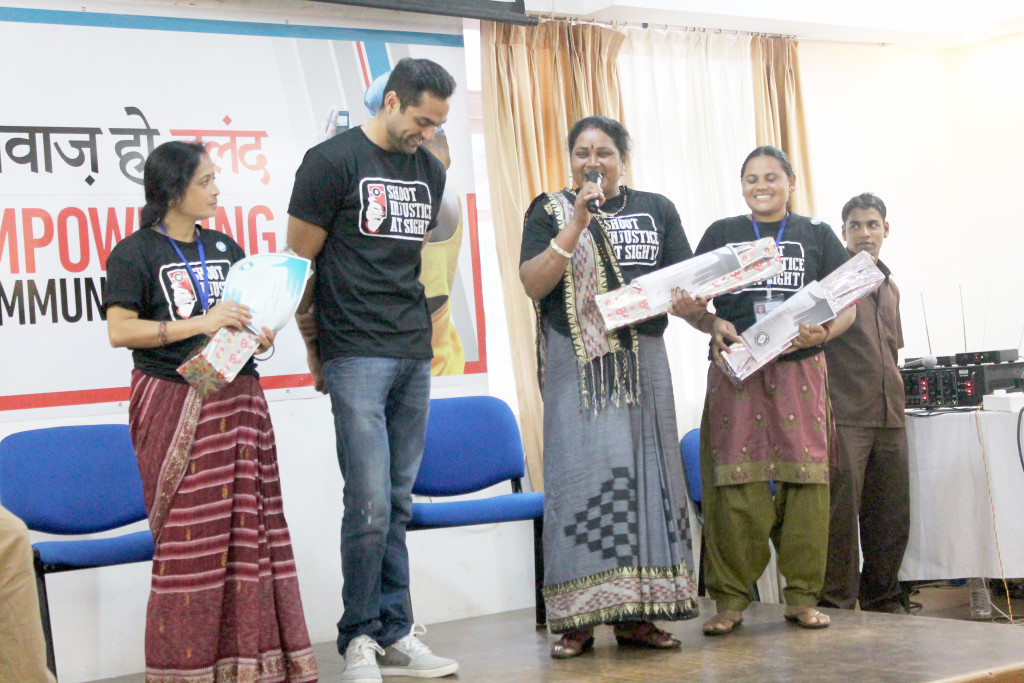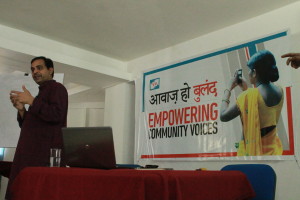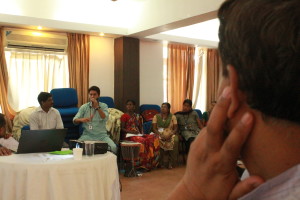 ArtiBai expresses joy on winning an award. L-R: Tanju Devi, Abhay Deol, AartiBai Valmik, Shanti Baraik[/caption]
ArtiBai expresses joy on winning an award. L-R: Tanju Devi, Abhay Deol, AartiBai Valmik, Shanti Baraik[/caption]
Before Aarti Bai Valmiki was trained in 2013 as a community correspondent, she had never held a camera in her life. She had only held a broom and faced daily discrimination as a woman and as an ‘untouchable’manual scavenger. On October 4, 2015, she won VV’s Most Consistent CC award for her stories. While receiving her award from actor Abhay Deol at the Video Volunteers’ National Meet, she stood proudly on stage and said,“Now when I go to sweep the police station in the morning, they say ‘be careful about what you say or do around her, or she will come in the afternoon with her camera and do a story'".
Aarti Bai is just one of the correspondents whose training was funded by Poorest Area Civil Society (PACS) and is part of the Video Volunteers-PACS network of correspondents spread across the seven PACS states of Bihar, Odisha, Madhya Pradesh, Jharkhand, Chattisgarh, UP and West Bengal. She, and others like Tanju Devi and Shanti Baraik, who are part of thisCommunity Correspondent Network (CCN), have primarily covered stories related to RTE (Right to Education) and MGNREGA (Mahatma Gandhi National Rural Employment Guarantee Act) till now. But, in the second phase of implementing the VV-PACS Community Correspondents Network initiative, they will now also look at the issues of women and girls in accessing their rights under the Domestic Violence Act. Furthermore, their stories on MGREGA and RTE issues will try to incorporate the added gender dimension — for example, unequal pay for the same MGNREGA work or the absence of functional toilets for girls in schools.
Fighting gender violence in communities
Besides individual training camps held in the PACS states, the National Meet became the ideal venue for VV to train the CCN network to spot ‘everyday patriarchy’, which is the root cause of gender violence and gender discrimination. A stellar series of workshops, many of them led by VV’s Stalin K., taught these community correspondents how to dismantle patriarchy in their own communities through video activism and video-led discussion clubs. Two of India’s leading trainers on gender sensitivity, Abha Bhaiyya from Jagori (Delhi) and Nandita Shah from Akshara(Mumbai), were also invited. Their sessions saw each gender step into the others’ shoes, role playing the opposite gender and mapping each other’s realities. After the workshops, our community correspondents were talking about starting video clubs to sensitize their communities about gender violence. They had understood how everyday patriarchy leads to gender violence and how this reinforced the wage gap between men and women.
[caption id="attachment_12594" align="aligncenter" width="1024"] Everyday Patriarchy is difficult to spot. Stalin K., Abha Bhaiya & Nandita Shah moderate as CCs dwell upon new perspectives.[/caption]
Everyday Patriarchy is difficult to spot. Stalin K., Abha Bhaiya & Nandita Shah moderate as CCs dwell upon new perspectives.[/caption]
Only a month after the National Meet has ended, our correspondents have already started small revolutions in their own neighbourhoods. Sunita Kasera, our correspondent from Rajasthan, held gender sensitivity workshops with 125 panchayat sarpanches (village heads) between 25th and 27th October. Other smaller initiatives and discussions clubs have also been started in the other states. Many of our correspondents have also begun incorporating workshop tips about what to document through videos to bolster legal cases filed against rape, acid attacks, domestic violence and gender-related wage-gap discrimination.
Added focus on advocacy
MGNREGA, RTE, the Forest Rights Act, the Swacch Bharat Abhiyaan (Clean India Campaign) and discrimination against Dalits, tribals and slum dwellers in accessing clean drinking water, were just some of the topics covered in the other workshops by top resource people from PACS (the Poorest Areas Civil Society), who were also the main funders of this National Meet, and trainers from RTE Forum, Amnesty International India and Water Aid India. On October 1st, in the workshops on MGNREGA and RTE, experts from PACS were able to have to have focused and meaningful conversations in smaller groups with VV’s correspondents, helping them to come up with concrete strategies on how to use videos to aid activism work and spark change in the context of these issues. Rajpal - PACS Programme Manager for MGNREGA - who co-led the MGNREGA thematic session was interested in not only training correspondents to capture the violations but also document the positive effect of such a rural employment scheme. This has resulted in more videos in the past one month showing how important MGNREGA payments are to the financial security of families living in some of the most marginalised and poverty-stricken areas of India.


Mihir Mohanty - PACS Programme Manager for Education - helped to facilitate the Education discussion, sharing how children who are female, Dalit, tribal, Muslim and/or disabled are more likely to experience discrimination in schools. The workshops were a good platform to train the correspondents to spot these instances of discrimination and create video narratives that were sensitive to them when they were documenting the implementation of RTE.
The National meet also hosted workshops on data journalism with IndiaSpend, the leading data journalism outlet in India. The session taught the CC's how to gather data from local government offices, using the Right to Information Act if needed, to address the information vacuum that happens when funds reach the village level and often "disappear." Bloomberg, whose journalists mentor some of our Community Correspondents, planned out five documentaries they are helping us to produce. There was a healthy debate – as always happens when our CCs meet journalists – about the balance between activism and journalism in VV’s work. Arijit Ghosh, Managing Editor of Bloomberg in South Asia, urged CCs to always get the other side and explained how to contact the Public Relations of corporates to get a response from companies, especially for controversial land acquisition stories. Many of the journalists who witnessed our training reported how the CCs gave them a much truer picture of development in India. The VV-PACS Community Correspondent Network, armed with their training, promises to continue bringing the ‘real’ India picture to viewers across the world.
See more highlights from the VV National Meet 2015:
Pay By the Cellular Gambling enterprises In britain, Finest Pay By Mobile phone Gambling enterprises
Pay By the Cellular Gambling enterprises In britain, Finest Pay By Mobile phone Gambling enterprises Articles Best Uk Online casino games What are the Almost every other Certificates An excellent Uk Gambling establishment Can have To Getting Courtroom? Faqs For the Greatest Cellular Casinos In the uk The most popular...
“Video Volunteers gave me a platform to go the extra mile for people”
Avijit Adhikary is a journalist with nearly 8000 days of field experience till date. In the past two decades, he has witnessed the ebb and flow of the media industry in India, with ripples felt in his region too. This includes the rise of digital media, the decline of print...


